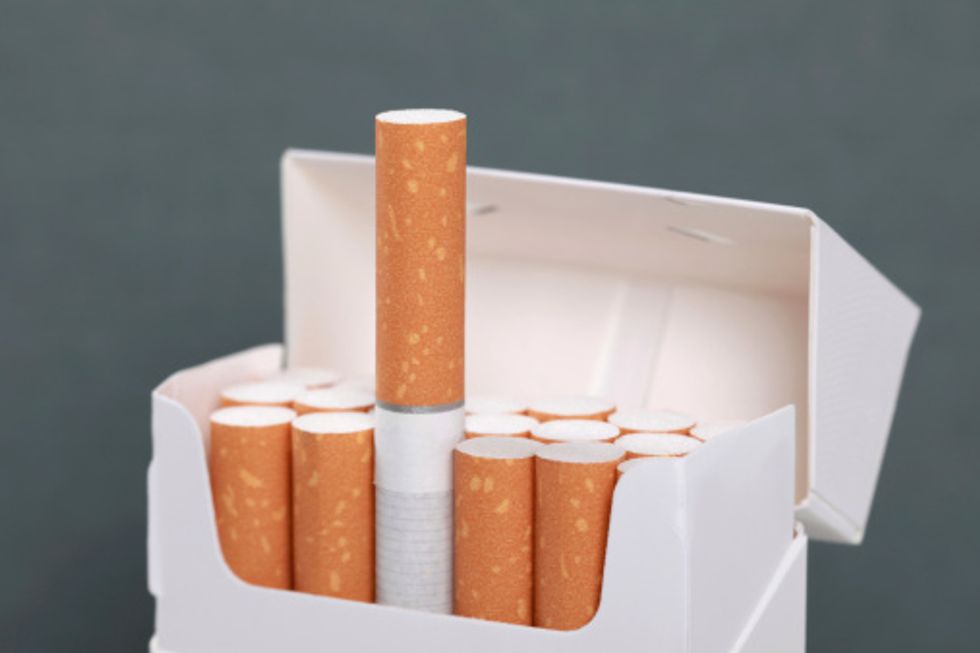
Then, one night in the midst of a huge thunderstorm, he realized he was out of cigarettes. He put on his coat and started to head out into the storm. As he tells it, he stopped on the back porch when he realized the insanity of leaving his family and the warmth of his home and heading out into a storm to buy cigarettes.
He never smoked another one. He did continue to smoke a pipe occasionally for another decade or so after that, until eventually it became clear that any and all tobacco use was dangerous.
I tell this anecdote in response to an interview I heard on the radio yesterday by a man who said that he'd never heard of anyone giving up smoking just because it wasn't easy to buy cigarettes at a drugstore.
I believe there's evidence—anecdotal and scientific—to counter that. Anything that makes it harder to continue a habit may make it easier and more likely for someone to quit.
Research shows that raising prices on cigarettes is a major deterrent to smoking, especially among young people who are just starting. Reduced access may also cause some people to think again. If they have to drive further or go somewhere they wouldn't normally go to buy a pack of cigarettes, is it worth the trouble?
Of course, for those who are seriously addicted, it will be. But if the CVS decision causes even one person—or a handful of people—to think again about their cigarette habit, it will be a good move.
Larry J. Merlo, president and CEO of CVS Caremark, says the company made the decision after looking at its changing role in the health care market. CVS Caremark already has an expanded role in health care through its pharmacists and nurse practitioners as they begin to offer more counseling and clinics within its pharmacies.
CVS executives estimate the company will give up about $2 billion a year in tobacco sales. But they hope that the move will put them in a better position for profitable deals with hospitals and health insurers and may help them appeal to health-conscious customers newly insured under the Affordable Care Act.
As Merlo said in the company's press release: "Ending the sale of cigarettes and tobacco products at CVS/pharmacy is the right thing for us to do for our customers and our company to help people on their path to better health. Put simply, the sale of tobacco products is inconsistent with our purpose."
That purpose—for CVS and the entire health care industry—should be improving the health of all Americans.
Some pro-tobacco forces say that CVS should also stop selling junk food and other unhealthy products if they want to be consistent. Merlo's response is that those other foods and products may be eaten or used in moderation without harm to health. That's not the case for tobacco products. They are always unhealthy.
Smoking is the leading cause of premature disease and death in the United States with more than 480,000 deaths annually. And even though cigarette packs have carried warning labels for nearly 50 years, some kids still take up the harmful habit.
Many medical groups support the move by CVS, including the American Medical Association, American Heart Association, American Cancer Society, American Lung Association and American Pharmacists Association, all of which have publicly opposed tobacco sales in retail outlets with pharmacies.
While CVS no doubt looked at the bottom line before making this decision, there is no question that the move can benefit Americans' health.
It's too late for my dad and many others of his generation. He died 12 years ago of pancreatic cancer—the same unrelenting cancer that claimed his father, mother, and, later, his brother. His father and brother also both smoked, and pancreatic cancer has been linked to smoking and second-hand smoke.
I hope that the CVS decision will encourage some smokers to think about trying to kick the habit. And maybe the reduced visibility and availability of cigarettes and tobacco will mean that fewer teenagers are tempted to start.
